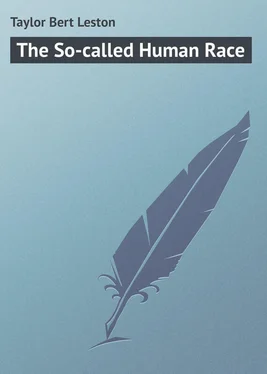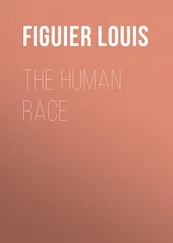Bert Taylor - The So-called Human Race
Здесь есть возможность читать онлайн «Bert Taylor - The So-called Human Race» — ознакомительный отрывок электронной книги совершенно бесплатно, а после прочтения отрывка купить полную версию. В некоторых случаях можно слушать аудио, скачать через торрент в формате fb2 и присутствует краткое содержание. ISBN: , Жанр: foreign_prose, foreign_humor, на английском языке. Описание произведения, (предисловие) а так же отзывы посетителей доступны на портале библиотеки ЛибКат.
- Название:The So-called Human Race
- Автор:
- Жанр:
- Год:неизвестен
- ISBN:http://www.gutenberg.org/ebooks/31138
- Рейтинг книги:4 / 5. Голосов: 1
-
Избранное:Добавить в избранное
- Отзывы:
-
Ваша оценка:
- 80
- 1
- 2
- 3
- 4
- 5
The So-called Human Race: краткое содержание, описание и аннотация
Предлагаем к чтению аннотацию, описание, краткое содержание или предисловие (зависит от того, что написал сам автор книги «The So-called Human Race»). Если вы не нашли необходимую информацию о книге — напишите в комментариях, мы постараемся отыскать её.
The So-called Human Race — читать онлайн ознакомительный отрывок
Ниже представлен текст книги, разбитый по страницам. Система сохранения места последней прочитанной страницы, позволяет с удобством читать онлайн бесплатно книгу «The So-called Human Race», без необходимости каждый раз заново искать на чём Вы остановились. Поставьте закладку, и сможете в любой момент перейти на страницу, на которой закончили чтение.
Интервал:
Закладка:
Bert Leston Taylor
The So-called Human Race
Once upon a summer’s night
Mused a mischief-making sprite,
Underneath the leafy hood
Of a fairy-haunted wood.
Here and there, in light and shade,
Ill-assorted couples strayed:
“Lord,” said Puck, in elfish glee,
“Lord, what fools these mortals be!”
Now he sings the self-same tune
Underneath an older moon.
Life to him is, plain enough,
Still a game of blind man’s buff.
If we listen we may hear
Puckish laughter always near,
And the elf’s apostrophe,
“Lord, what fools these mortals be!”
Foreword
Bert Leston Taylor (known the country over as “B. L. T.”) was the first of our day’s “colyumists” – first in point of time, and first in point of merit. For nearly twenty years, with some interruptions, he conducted “A Line-o’-Type or Two” on the editorial page of the Chicago Tribune . His broad column – broad by measurement, broad in scope, and a bit broad, now and again, in its tone – cheered hundreds of thousands at the breakfast-tables of the Middle West, and on its trains and trolleys. As the “Column” grew in reputation, “making the Line” became almost a national sport. Whoever had a happy thought, whoever could handily turn a humorous paragraph or tune a pointed jingle, was only too glad to attempt collaboration with B. L. T. Others, possessing no literary knack, chanced it with brief reports on the follies or ineptitudes of the “so-called human race.” Some of them picked up their matter on their travels – these were the “Gadders.” Others culled oddities from the provincial press, and so gave further scope to “The Enraptured Reporter,” or offered selected gems of gaucherie from private correspondence, and thus added to the rich yield of “The Second Post.” Still humbler helpers chipped in with queer bits of nomenclature, thereby aiding the formation of an “Academy of Immortals” – an organization fully officered by people with droll names and always tending, as will become apparent in the following pages, to enlarge and vary its roster.
All these contributors, as well as many other persons who existed independently of the “Line,” lived in the corrective fear of the “Cannery,” that capacious receptacle which yawned for the trite word and the stereotyped phrase. Our language, to B. L. T., was an honest, living growth: deadwood, whether in thought or in the expression of thought, never got by, but was marked for the burning. The “Cannery,” with its numbered shelves and jars, was a deterrent indeed, and anyone who ventured to relieve himself as “Vox Populi” or as a conventional versifier, did well to walk with care.
Over all these aids, would-be or actual, presided the Conductor himself, furnishing a steady framework by his own quips, jingles and philosophizings, and bringing each day’s exhibit to an ordered unity. The Column was more than the sum of its contributors. It was the sum of units, original or contributed, that had been manipulated and brought to high effectiveness by a skilled hand and a nature wide in its sympathies and in its range of interests.
Taylor had the gift of opening new roads and of inviting a willing public to follow. Or, to put it another way, he had the faculty of making new moulds, into which his helpers were only too glad to pour their material. Some of these “leads” lasted for weeks; some for months; others persisted through the years. The lifted wand evoked, marshalled, vivified, and the daily miracle came to its regular accomplishment.
Taylor hewed his Line in precise accord with his own taste and fancy. All was on the basis of personal preference. His chiefs learned early that so rare an organism was best left alone to function in harmony with its own nature. The Column had not only its own philosophy and its own æsthetics, but its own politics: if it seemed to contravene other and more representative departments of the paper, never mind. Its conductor had such confidence in the validity of his personal predilections and in their identity with those of “the general,” that he carried on things with the one rule of pleasing himself, certain that he should find no better rule for pleasing others. His success was complete.
His papers and clippings, found in a fairly forward state of preparation, gave in part the necessary indications for the completion of this volume. The results will perhaps lack somewhat the typographical effectiveness which is within the reach of a metropolitan daily when utilized by a “colyumist” who was also a practical printer, and they can only approximate that piquant employment of juxtaposition and contrast which made every issue of “A Line-o’-Type or Two” a work of art in its way. But no arrangement of items from that source could becloud the essential nature of its Conductor: though “The So-Called Human Race” sometimes plays rather tartly and impatiently with men’s follies and shortcomings, it clearly and constantly exhibits a sunny, alert and airy spirit to whom all things human made their sharp appeal.
The So-Called Human Race
A LINE-O’-TYPE OR TWO
Motto: Hew to the Line, let the quips fall where they may.
My readers are a varied lot;
Their tastes do not agree.
A squib that tickles A is not
At all the thing for B.
What’s sense to J, is folderol
To K, but pleases Q.
So, when I come to fill the Col,
I know just what to do.
It is refreshing to find in the society columns an account of a quiet wedding. The conventional screams of a groom are rather trying.
A man will sit around smoking all day and his wife will remark: “My dear, aren’t you smoking too much?” The doctor cuts him down to three cigars a day, and his wife remarks: “My dear, aren’t you smoking too much?” Finally he chops off to a single after-dinner smoke, and when he lights up his wife remarks: “John, you do nothing but smoke all day long.” Women are singularly observant.
Sir: A gadder friend of mine has been on the road so long that he always speaks of the parlor in his house as the lobby. E. C. M.
With the possible exception of Trotzky, Mr. Hearst is the busiest person politically that one is able to wot of. Such boundless zeal! Such measureless energy! Such genius – an infinite capacity for giving pains!
Ancestor worship is not peculiar to any tribe or nation. We observed last evening, on North Clark street, a crowd shaking hands in turn with an organ-grinder’s monkey.
“In fact,” says an editorial on Uncongenial Clubs, “a man may go to a club to get away from congenial spirits.” True. And is there any more uncongenial club than the Human Race? The service is bad, the membership is frightfully promiscuous, and about the only place to which one can escape is the library. It is always quiet there.
Sign in the Black Hawk Hotel, Byron, Ill.: “If you think you are witty send your thoughts to B. L. T., care Chicago Tribune. Do not spring them on the help. It hurts efficiency.”
The handsome clerk at the Harvey House makes this profound observation: Any girl will flirt as the train is pulling out.
She formerly talked of the weather,
The popular book, or the play;
Her old line of chat
Was of this thing or that
In the fashions and fads of the day.
Интервал:
Закладка:
Похожие книги на «The So-called Human Race»
Представляем Вашему вниманию похожие книги на «The So-called Human Race» списком для выбора. Мы отобрали схожую по названию и смыслу литературу в надежде предоставить читателям больше вариантов отыскать новые, интересные, ещё непрочитанные произведения.
Обсуждение, отзывы о книге «The So-called Human Race» и просто собственные мнения читателей. Оставьте ваши комментарии, напишите, что Вы думаете о произведении, его смысле или главных героях. Укажите что конкретно понравилось, а что нет, и почему Вы так считаете.












